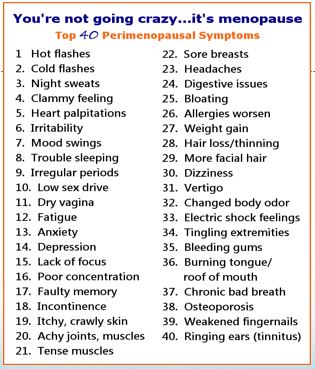Menopause marks the end of the reproductive years. The ovaries stop producing eggs and the hormone estrogen which helps to control the menstrual cycle. This natural process can happen usually by the average age of 51, or surgically if the ovaries are removed. It may also happen prematurely before 45.
Like everything else in a woman’s life, menopause is complicated. It involves a menopausal transition or “perimenopause” which is irregular menses (period) leading up to the final hoorah. Some women miss a period for several months and then it returns before completely stopping. In menopause, there is a dramatic variation in hormones including Follicle Stimulating Hormone (FSH) and estradiol. Then the postmenopausal period occurs 12 months after a woman’s final period.
Most women have a general idea about what to expect during menopause, but it is surprising how few are prepared for this life-changing transition when it actually happens. Former First Lady, Michelle Obama, described her brunt with menopause in the Michelle Obama podcast episode “What Your Mother Never Told You About Health” talk with Dr. Sharon Malone, OBGYN. The reality is that menopause can affect your health, work, and personal life. It can be a long and drawn-out intermission.
Signs and symptoms

Perimenopause symptoms can be confusing. Many women are not aware of the many symptoms that can occur when their hormone levels begin to change. It is important to note that menopause affects women differently (part of what makes it so confusing).
The more common symptoms include hot flashes, night sweats, vaginal dryness, and sleep disturbance. Your cycle may become shorter or longer, and bleeding may be lighter or heavier.
More often than not, women report that these symptoms negatively affect their quality of life. Sweating bullets at work during a presentation is not cool nor is having to change the sheets in the middle of the night. The extreme fatigue and feeling overwhelmed can dampen even the most jovial mood in a matter of minutes. And as if that was not enough, insomnia becomes your nemesis.
Diagnosis
In normal healthy women over 45 years, we make the diagnosis of menopause if a woman has not had her menses in 12 months, in the absence of other biological or physiological causes. Women under 40 years with perimenopausal symptoms may be diagnosed with premature ovarian failure. Physicians need to rule out special situations where a woman may not have her menses for a long period of time. This includes the use of contraceptives, hysterectomy, and underlying disorders such as polycystic ovarian syndrome (PCOS). Your physician may or may not choose to request labs in your diagnosis.
Treatment
Menopause is a natural phase of a woman’s life and most times does not need to be treated. However, if the changes that occur with menopause becomes disruptive to a woman’s wellbeing then effective treatment options are available.
One of the main treatments includes Hormone Replacement Therapy (HRT). This means taking estrogen only if you have had a hysterectomy and no longer have a uterus, or dual therapy (estrogen + progesterone) if you still have a uterus. Progesterone is given with estrogen to prevent endometrial cancer. HRT is available in several forms: pill, patches, gels, etc. and may not be an option for some women due to their personal and family history. Current recommendations for relief of vasomotor symptoms and prevention of osteoporosis in high-risk women is the lowest possible dose of HRT for the shortest amount of time. Additionally, antidepressants can be effectively used for women with mood disorders secondary to menopause.
Your doctor should re-evaluate you frequently, at least every 6 months whilst on this therapy. Some physicians actually work with pharmacies to individualize therapy for their patients.
Risks
Like all other medications, HRT has its adverse effects. It may increase your risk of deep vein thrombosis (blood clots), cardiovascular (heart) disease, liver disease, osteoporosis, fractures, uterine cancer, and breast cancer. For this and other reasons, women opt to explore non-hormonal forms of treatment.
Complementary and Alternative Management for Menopause
-
Stress management: This can be achieved through various ways mind & body lifestyle therapies such as breathing exercises, yoga, massages, aromatherapy, acupuncture, or other spiritual or physical relaxation techniques.
-
Exercise: Weight-bearing exercises help to strengthen your muscles and bones which usually become weak following menopause leading to fractures.
-
Quit Smoking: Smoking cessation decreases your risk of heart disease, osteoporosis, and several types of cancers.
-
Healthy balanced diet: Try to include adequate portions of dark green, leafy vegetables, fruits, and legumes in your daily meals. These are good natural sources of phytoestrogens which are similar to estrogen which the body lacks following menopause. Avoid “triggers” for hot flashes including caffeine, alcohol, spicy foods, and hot (temperature) drinks or foods.
-
Individual counseling: Find a therapist or physician to guide you through this challenging transition. They can help you form tailored strategies for handling stress, depression, and anxiety that may accompany menopause.
-
Herbal and naturopathic remedies:
Chasteberry is useful for dysfunctional uterine
bleeding in perimenopausal women.
Kava can be used to relieve sleep disturbances, irritability, and
**There is limited scientific evidence for use of some of these herbal remedies in treating the symptoms of menopause. Speak to your OBGYN or Family Physician before starting any of these supplements to discuss whether these are suitable for you.
